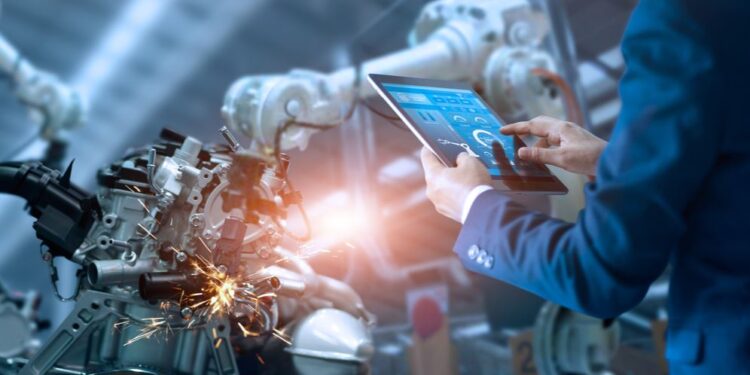Step into the captivating world of intelligent manufacturing and automation, where cutting-edge technology and traditional production processes seamlessly combine. In this ever-evolving era, innovation knows no limits as it revolutionizes industries in unimaginable ways.
Embark on an exhilarating journey through seven transformative points that reveal the dawn of the future. Get ready for a revelation on how these breakthroughs transform the manufacturing landscape and move us toward unlimited possibilities!
What is Smart Manufacturing?
Smart manufacturing integrates advanced technologies and data analytics into manufacturing, surpassing traditional methods to enhance efficiency, quality, and overall productivity. Interconnected devices, fueled by the Internet of Things (IoT), collect real-time data at various production stages, allowing for greater visibility and control. Sophisticated algorithms analyze this data, identifying patterns and optimizing processes.
Predictive maintenance is crucial, utilizing sensors and machine learning to detect potential equipment failures before they occur, minimizing downtime and reducing long-term maintenance costs. Digital twins, virtual replicas of physical assets, enable simulation and analysis without disrupting actual production, facilitating efficient planning and testing.
Smart manufacturing improves supply chain management by providing real-time insights into inventory levels, demand forecasting, and supplier performance, enhancing coordination throughout the value chain.
Intelligent manufacturing transforms factories into highly connected ecosystems for higher productivity, greater flexibility, improved product quality, reduced costs, and increased sustainability by harnessing technologies like IoT, big data analytics, AI, robotics, and cloud computing.
This realm of intelligent machines working with human expertise marks the future of manufacturing, ushering in unparalleled innovation and endless possibilities.
The Benefits of Smart Manufacturing and Automation
Smart manufacturing and automation have revolutionized how industries operate, bringing many benefits to businesses. One key advantage is increased productivity. Automated processes streamline and accelerate production, resulting in higher output levels and faster turnaround times.
Improved quality control is another benefit. Automation systems consistently monitor and regulate various parameters during production, ensuring products meet strict quality standards. This reduces the risk of defects or errors, increasing customer satisfaction.
Cost reduction is also a significant advantage of intelligent manufacturing and automation. By eliminating manual labor for repetitive tasks, companies can save on labor costs while increasing efficiency. Additionally, automated systems reduce waste by optimizing resource utilization.
Furthermore, smart manufacturing enables real-time data collection and analysis. Sensors embedded in machinery and equipment provide manufacturers valuable insights into their operations. This data-driven approach allows for proactive decision-making based on accurate information.
Moreover, automation enhances workplace safety by reducing human involvement in hazardous or physically demanding tasks. Automating these processes protects employees from potential risks or injuries.
Smart manufacturing promotes sustainability through energy efficiency initiatives. Automated systems optimize energy consumption by adjusting settings according to demand fluctuations.
The Role of Automation in the Manufacturing Process
Automation is vital in revolutionizing the manufacturing industry and enhancing efficiency and productivity through integrating intelligent technologies. Its primary function is eliminating human error and taking over repetitive tasks to ensure accuracy and precision, improving product quality, and reducing waste.
Beyond error reduction, automation significantly boosts productivity by accelerating production cycles. Machines operate continuously without breaks or fatigue, enabling manufacturers to meet increasing demands while upholding high standards.
An important aspect of automation is cost reduction. Automated tasks like assembly lines or packaging processes lead to long-term savings on labor costs. Automated systems often require less maintenance than manual operations, contributing to overall cost efficiency.
Moreover, automation facilitates real-time data collection and analysis, empowering manufacturers with better decision-making capabilities. Advanced sensors and monitoring systems integrated into machinery provide insights into key performance indicators (KPIs) such as machine uptime and energy consumption.
Challenges and Concerns Surrounding Smart Manufacturing and Automation
1. Workforce Transition
The fear of job loss is a valid concern, and acknowledging the emergence of new roles is essential. Emphasizing retraining programs and highlighting the potential for skilled employment in programming and data analysis can help alleviate these concerns.
2. Data Security
The interconnected nature of smart manufacturing indeed introduces cybersecurity risks. Robust security measures, encryption protocols, and continuous monitoring are essential to safeguard sensitive data and protect against potential breaches.
3. Cost of Implementation
The upfront investment can be a barrier for some companies. However, viewing it as a strategic investment in long-term efficiency and competitiveness is essential. Comprehensive cost-benefit analyses and phased implementation plans can help mitigate financial concerns.
4. Integration Challenges
Legacy systems can be a stumbling block, but addressing integration challenges is essential for a smooth transition. Incremental upgrades, modular implementations, and strategic planning can facilitate the integration of new technologies with existing systems.
5. Technical Complexity
The diverse range of technologies involved in intelligent manufacturing requires a skilled workforce. Collaborations with educational institutions, upskilling programs, and hiring strategies focused on technical proficiency can help bridge the skills gap.
6. Reliability Issues
While automation enhances efficiency, the potential for malfunctions and downtime necessitates robust contingency plans. Regular maintenance, real-time monitoring, and quick response protocols are essential to minimize disruptions.
7. Ethical Considerations
Addressing privacy concerns related to data collection is essential for ethical, intelligent manufacturing practices. Implementing transparent data policies, obtaining informed consent, and prioritizing workers’ rights and safety contribute to a responsible and ethical adoption of automation.
7 Key Technologies Driving the Future of Smart Manufacturing
The future of intelligent manufacturing is shaped by cutting-edge technologies revolutionizing the industry, driving unprecedented efficiency, productivity, and innovation. Explore seven game-changing advancements leading the way.
Internet of Things (IoT)
Imagine a dance of IoT-enabled devices and sensors, choreographing a seamless performance. Manufacturers aren’t just making things; they’re orchestrating real-time data to fine-tune production and maintenance schedules. It’s like having a crystal ball, predicting hiccups before they even dare to disrupt the rhythm.
Artificial Intelligence (AI) and Machine Learning
Meet the maestro, AI, conducting a symphony of data analysis to make any human maestro blush. These AI-powered systems don’t just crunch numbers; they compose intelligent decisions and automate tasks with the finesse of a virtuoso. The showstopper? Machine learning algorithms evolve and improve operational efficiency, making every performance better than the last.
Robotics
Enter the stage, where robots aren’t just sidekicks but the stars themselves. Picture collaborative robots waltzing with humans on assembly lines and autonomous robots taking the lead in handling repetitive tasks. It’s a revolution, transforming manufacturing operations into a captivating performance.
Augmented Reality (AR)
Experience a magical overlay of digital wonders in the real world with AR. Workers become wizards, accessing instructions, training materials, or even summoning remote expert assistance—all hands-free and in real-time. It’s not just manufacturing; it’s a magic show.
3D Printing/Additive Manufacturing
Witness the creation of intricate designs in the blink of an eye. Additive manufacturing isn’t just building parts; it’s sculpting possibilities. Imagine a world where complexity is embraced, waste minimized, and costs slashed—this is the artistry of 3D printing.
Cloud Computing
Picture a cloud, not of uncertainty but of collaboration. Manufacturers are leveraging cloud-based platforms to store vast amounts of data securely. It’s not just about storage; it’s a collaboration symphony connecting different locations and partners seamlessly.
Cybersecurity Solutions
As the curtain rises on connectivity, so does the need for a vigilant guardian. Cybersecurity is not just a shield; it’s the unsung hero safeguarding sensitive data. It’s not just protection; it’s the backbone of uninterrupted operations.
Conclusion
In conclusion, smart manufacturing and automation represent a transformative force in industrial processes, offering productivity, efficiency, safety, and sustainability gains. Incorporating real-time data analytics, AI, and robotics enables streamlined operations and the delivery of high-quality products. While job displacement and security risks exist, proactive planning and training programs can mitigate these concerns. Successful implementation necessitates the development of a strategic roadmap aligned with business goals, often with the assistance of technology vendors or consultants. The era of intelligent manufacturing is upon us, fostering a future where machines seamlessly collaborate with humans, propelling industries to new levels of precision, speed, and quality. Embracing this revolution isn’t merely about keeping pace but leading in an interconnected world where innovation is the linchpin of success. Let’s wholeheartedly embrace this new era of intelligent production, integrating automation and advanced technologies to shape tomorrow’s world.


















